

Can A Fitness Tracker Really Change Your Life? Part One Of A First-Person Experiment. In 2013, fitness tracking is all around us: in iPhone apps like Map My Fitness and DailyBurn; built into your Samsung Galaxy S4 phone; in a device on your wrist if you own a Nike+ Sportswatch or a Pebble smartwatch.
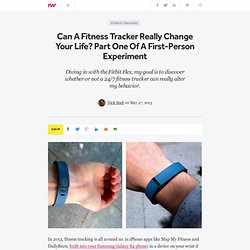
But does any of it really work? Not just do they track your fitness, but do they really help you change your life? One might expect that these trackers primarily help the already motivated enough achieve their goals faster, leaving the rest of us drowning in useless data. Or can having that data really help the average Joe improve their health?
These issues are at the core of the quantified self movement, and I wanted to find out for my self. Quantified Me The Quantified Self concept sounds a lot more intense than it really is. As someone with no prior experience with wearable devices, I decided to jump headfirst into fitness tracking with the Fitbit Flex. Why The Fitbit Flex? That part about manual inputs is important. Fortunately, setting up the device is relatively easy. Health and Medicine at the Inflection Point. TEDMEDLiveBologna. Hacking Healthcare: The Rise of the Citizen Doctor - (8 Exponential... “Per garantire la Sanità dobbiamo chiudere tutti i piccoli ospedali” Bionic.ly. The STAT Ten: Eric Topol, MD Speaks Out on Digital Health.
Fifteen Influencers Shaping Digital Health. The digital health ecosystem is advancing at a rapid pace and it’s an exciting time to be on the cusp of a health revolution.
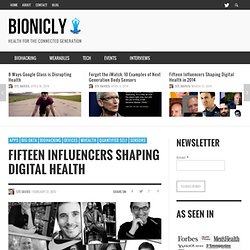
Like all revolutions, a revolutionary – or revolutionaries – are required to challenge the status quo and bring about change to the system either through brute force or, in digital health’s case, doing things better, cheaper and more innovatively. While the list below is totally subjective it’s a good start to identify those that are making a difference in health by merging the worlds of biology and technology together. In no particular order. 1. Eric Topol M.D. American cardiologist, geneticist, and researcher but perhaps more importantly Topol is the author of The Creative Destruction of Medicine: How the Digital Revolution Will Create Better Health Care book and vigorous proponent of digital health. 2. 3. XPRIZE: Healthcare, Consumerized. By Gioia MessingerGioia is Founder and CEO of LinkedObjects, a Global 100 Mentor at the Founder Institute, a Lecturer at U.C.
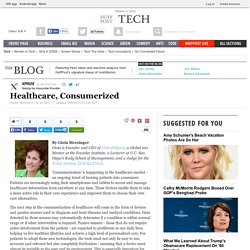
San Diego's Rady School of Management, and a Judge for the Nokia Sensing XCHALLENGE. 'Consumerization' is happening in the healthcare market - an ongoing trend of turning patients into consumers. Patients are increasingly using their smartphones and tablets to access and manage healthcare information from anywhere at any time. Prepare For A Personalized, Preventative Health Care Revolution.
If you were to pick a major industry about to see an incredible amount of change, you might choose health care.
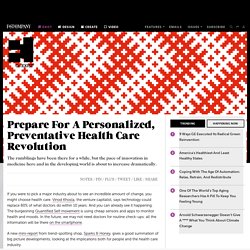
Vinod Khosla, the venture capitalist, says technology could replace 80% of what doctors do within 10 years. And you can already see it happening. The burgeoning Quantified Self movement is using cheap sensors and apps to monitor health and moods. In the future, we may not need doctors for routine check-ups: all the information will be there on the smartphone. A new mini-report from trend-spotting shop, Sparks & Honey, gives a good summation of big picture developments, looking at the implications both for people and the health care industry. The key point is that health care is no longer a specialists’ domain. "Doctors are being disrupted in a very big way," says Sparks & Honey founder Terry Young. In the future, we might get an app and sensor along with our prescriptions, Young says. Thomas Goetz: E' ora di riconcepire i dati medici. How technology can empower patients, with 4 home tests on your iPhone TED Blog.
Eric Dishman is used to thinking about how technology can transform the world of health care.
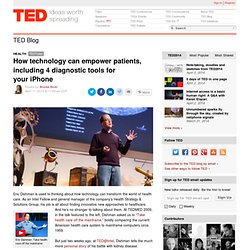
As an Intel Fellow and general manager of the company’s Health Strategy & Solutions Group, his job is all about finding innovative new approaches to healthcare. Eric Dishman: Take health care off the mainframe And he’s no stranger to talking about them. At TEDMED 2009, in the talk featured to the left, Dishman asked us to “Take health care off the mainframe,” boldly comparing the current American health care system to mainframe computers circa 1959. But just two weeks ago, at TED@Intel, Dishman tells the much more personal story of his battle with kidney disease.
To say that his battle is with disease isn’t the full story. Empathize Like A Doctor, Design Like An Entrepreneur Co.Exist World changing ideas and innovation. Every day it seems that we read about the launch of a new startup or technology application claiming to disrupt and reinvent the health care system.
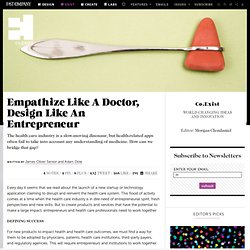
This flood of activity comes at a time when the health care industry is in dire need of entrepreneurial spirit, fresh perspectives and new skills. But to create products and services that have the potential to make a large impact, entrepreneurs and health care professionals need to work together. Defining Success For new products to impact health and health care outcomes, we must find a way for them to be adopted by physicians, patients, health care institutions, third-party payers, and regulatory agencies.
This will require entrepreneurs and institutions to work together. Daniel Kraft: Il futuro della medicina? C'è un app su misura.